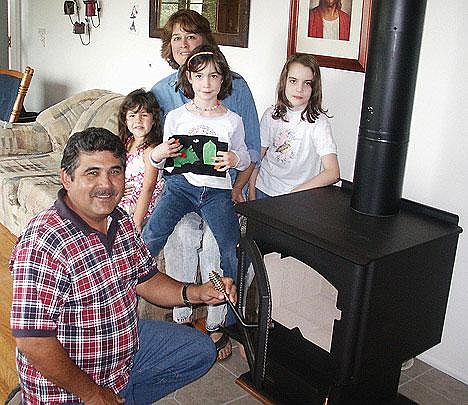Response low to stove changeout
By BRENT SHRUM Western News Reporter
Response to a program to allow low-income households in the Libby area exchange their old woodstoves for new models at no cost has been slow, according to organizers.
The stove changeout program, aimed at reducing air pollution in the Libby area, kicked off with a stove fair at the Memorial Center in June. Since then, around 40 stoves have been installed with about 20 more waiting in the wings, said program coordinator Jerry Marquez.
That leaves more than 200 stoves still available to eligible households. County sanitarian Ron Anderson, who is overseeing the changeout program, said he hopes people sign up now instead of waiting for colder weather, when installation will be much more difficult.
"Now is a great time to do a stove installation, because you don't have to turn the stove off and have the house cool down," Anderson said.
The stoves are available at no charge — including installation — to Libby-area residents who qualify for the Low Income Energy Assistance Program and other public assistance programs. Enrollment in those programs is not required, but proof of eligibility is. Eligibility can be determined by the public assistance office, by the Head Start program and at the Senior Citizens Center.
Anderson encouraged anyone who may be eligible to apply.
"If they're sitting back, just not sure if they're eligible or not, please, please contact us," he said.
Caryle Cox's family was one of the first to apply.
"We're extremely grateful," she said, "and I was shocked to find out there were people who haven't signed up yet."
The installation got rid of the old stove in the basement of the home and put the new, more efficient stove on the main floor. The installation also included a new hearth pad and a new chimney that's expected to draw better than the old one."
Cox said she expects to be "pleasantly surprised," after struggling to keep the old stove fueled last winter.
"It was constant," she said. "'Feeding the beast,' I called it."
The changeout program was developed following the listing of the Libby area last December as a non-attainment area under new federal air quality standards governing smaller particles, known as PM-2.5, than previous PM-10 standards. Federal law requires a control plan to be adopted within three years. Studies have shown the primary component in local PM-2.5 pollution to be from woodstoves.
"People need to realize that not only do they need to do this, they need to do this now," Anderson said.
The county health board has already developed a plan, which will be passed on to the county commissioners and Libby City Council for approval, that would ban the use of non-EPA-certified woodstoves starting in January 2007.
"To be honest there's really no way we can get around this," Anderson said.
Landlords with renters who qualify for the program are eligible to participate but must make a $500 co-payment. Economically, that should be a "no-brainer" when the cost of the stove, chimney and installation are factored in, Anderson said.
"Those are worth up to 3,000 bucks," he said.
The Heart, Patio and Barbecue Association, which represents the woodstove industry, donated 300 stoves for the changeout program along with related equipment and cash. A $100,000 EPA grant will help pay for stove installation.
HPBA representatives have said the project will serve as a demonstration of the benefits of converting to cleaner stoves in an environment not complicated by other sources of air pollution sources. EPA representatives have said that what is learned in Libby will be used in other areas with woodsmoke problems across the country.
The 300 stoves are earmarked for installation in low-income households this year. Next year, the second phase of the program will focus on households not meeting low-income guidelines. Various sources of funding are being pursued to offset costs.
More information on the program is available by calling 293-7781 extension 212 or emailing jmarquez@libby.org .

